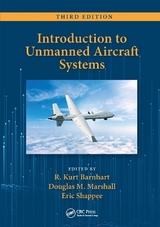
Introduction to Unmanned Aircraft Systems
Apple Academic Press Inc. (Verlag)
978-1-4822-6393-0 (ISBN)
- Titel erscheint in neuer Auflage
- Artikel merken
Fully updated and significantly expanded, this new Second Edition:
Reflects the proliferation of technological capability, miniaturization, and demand for aerial intelligence in a post-9/11 world
Presents the latest major commercial uses of UASs and unmanned aerial vehicles (UAVs)
Enhances its coverage with greater depth and support for more advanced coursework
Provides material appropriate for introductory UAS coursework in both aviation and aerospace engineering programs
Introduction to Unmanned Aircraft Systems, Second Edition capitalizes on the expertise of contributing authors to instill a practical, up-to-date understanding of what it takes to safely operate UASs in the National Airspace System (NAS). Complete with end-of-chapter discussion questions, this book makes an ideal textbook for a first course in UAS operations.
Douglas M. Marshall, J.D., is the president of TrueNorth Consulting LLC and an adjunct professor at the International Aviation Law Institute, De Paul University College of Law. Previously, he was division manager, UAS regulations and standards development at the Physical Science Laboratory, New Mexico State University; and professor of aviation at the University of North Dakota. He has participated full-time in UAS-related activities for more than 10 years, coedited and authored several books and publications, and served on numerous committees dedicated to the development of UAS. Currently, he chairs the ASTM F38.02.01 Task Group on Standards for Operations Over People. Richard K. Barnhart, Ph.D., is a professor, associate dean of research, executive director of the Applied Aviation Research Center, and graduate faculty member at Kansas State Polytechnic. Previously, he was the head of the Aviation Department at Kansas State Polytechnic, and associate professor and acting department chair of the Aerospace Technology Department at Indiana State University. Dr. Barnhart holds an airframe and power plant certificate with inspection authorization, and is a former FAA-designated examiner for aircraft maintenance technicians. His industry experience includes work as an R&D inspector with Rolls-Royce Engine Company and as a systems instructor for American Trans Air. Eric Shappee has been active in the field of aviation since 1986, and teaching since 1995. He is currently a professor of aviation in the Professional Pilot Program at Kansas State Polytechnic. He holds a commercial pilot certificate with instrument, multiengine, and glider ratings. He is a certified flight instructor with gold seal and a member of the International Society of Air Safety Investigators. He has attended the NTSB Academy, developed several risk assessment tools for Kansas State Polytechnic and other aviation organizations, and worked with unmanned aerial systems including the Predator and Aerosonde. Michael Thomas Most, Ph.D., is the academic lead of the Unmanned Aircraft Systems Program at Kansas State Polytechnic. Previously, Dr. Most was an associate professor and chair of the Department of Aviation Technologies at Southern Illinois University. He has authored numerous articles for technical and refereed journals on aviation, aircraft design, and the use of GIS to investigate aviation-related environmental externalities, and delivered several peer-reviewed papers on these same topics. He holds FAA private pilot and A&P technician certificates, as well as ASTM National Center for Aerospace and Transportation Technologies avionics certification.
History
Charles Jarnot, Edited by Ben Trapnell
UAS Applications
Mark Blanks
The "System" in UAS
Joshua Brungardt with Kurt Barnhart
UAS Sensing: Theory and Practice
Gabe Ladd
U.S. Aviation Regulatory System
Douglas M. Marshall
Human Factors in Unmanned Aerial Systems
Warren Jensen
Safety Assessments
Eric J. Shappee
Export Control and ITAR
Eric McClafferty and Rose Mooney
Unmanned Aircraft System Design
Brian Argrow
UAS Airframe and Powerplant Design
Michael Most
UAS Subsystem Nexus: The Electrical System
Michael Most
Communication Systems
Saeed M. Khan
Command and Control
Nathan Maresch
Unmanned Aircraft Subsystem Integration
William H. Semke
Detect and Avoid
Dallas Brooks and Stephen Cook
Policy and Public Perception
Ben Miller
The Future of Unmanned Aircraft Systems
R. Kurt Barnhart
Epilogue: A Final Word
Richard Kurt Barnhart, Douglas M. Marshall, Michael T. Most, and Eric J. Shappee
| Zusatzinfo | N/A- There are 26 figures to appear as scatter color; 10 Tables, black and white; 26 Illustrations, color; 95 Illustrations, black and white |
|---|---|
| Verlagsort | Oakville |
| Sprache | englisch |
| Gewicht | 1066 g |
| Themenwelt | Sozialwissenschaften ► Politik / Verwaltung ► Europäische / Internationale Politik |
| Sozialwissenschaften ► Politik / Verwaltung ► Politische Theorie | |
| Technik ► Elektrotechnik / Energietechnik | |
| Technik ► Fahrzeugbau / Schiffbau | |
| Technik ► Luft- / Raumfahrttechnik | |
| Technik ► Maschinenbau | |
| Technik ► Umwelttechnik / Biotechnologie | |
| ISBN-10 | 1-4822-6393-9 / 1482263939 |
| ISBN-13 | 978-1-4822-6393-0 / 9781482263930 |
| Zustand | Neuware |
| Haben Sie eine Frage zum Produkt? |
aus dem Bereich



